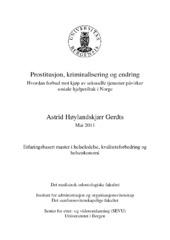| dc.description.abstract | Background: Since January 1st 2009 the purchase of sexual services has been criminalized in Norway. The new law criminalizing the clients has been understood to impose a zerotolerance-strategy towards prostitution. So far, harmreduction has been the main approach of the health- and social services to women in prostitution, an approach seen as the opposite to zerotolerance. Purpose: The purpose of this study has been to examine to which extent criminalizing the purchase of sexual services affects the conditions in which the social services operate and also possible effect on services offered to women selling sex. Theoretical framework is partly based on various understandings of prostitution as a phenomenon, partly based on instrumental and institutional perspectives on changes of organization. The relationship between discourse, the law and the approach within social services is understood by theory of policy. Material: The data is interviews with leaders in the field of social services and administrative employees in Oslo, Bergen, Stavanger and Kristiansand. In addition reports from the social services, municipal and governmental documents have been used as a source of data. Method: This is a qualitative case-based study. Primarily, data is collected through qualitative semistructured interviews. A theme-based approach of analysis is used to structure the findings and to interpret them in relation to the theoretical framework. Findings: The study finds that conditions for the social services have changed since the implementation of the law. Three main factors are of importance: Changes in the prostitution market, a more clearly spoken abolitionist policy and economic incentives in direction of a stronger focus on prostitutionexit. However, attempts based on harmreduction are still a part of the social services, although they may seem to be less valued than before. Conclusion: Based on the theoretical framework the study suggests five different ways of response in the social services due to criminalizing the purchase. Although none of them provides a convincing interpretation alone, they all describe a part of the picture. This leads to a sixth scenario which understands the law in a long term perspective and combines its instrumental and institutional effects. Based on the various scenarios, criminalizing the purchase of sexual services can be seen as a step towards zerotolerance to prostitution, both as an act of regulation and possibly also as a purpose for the welfare state. | en_US |
